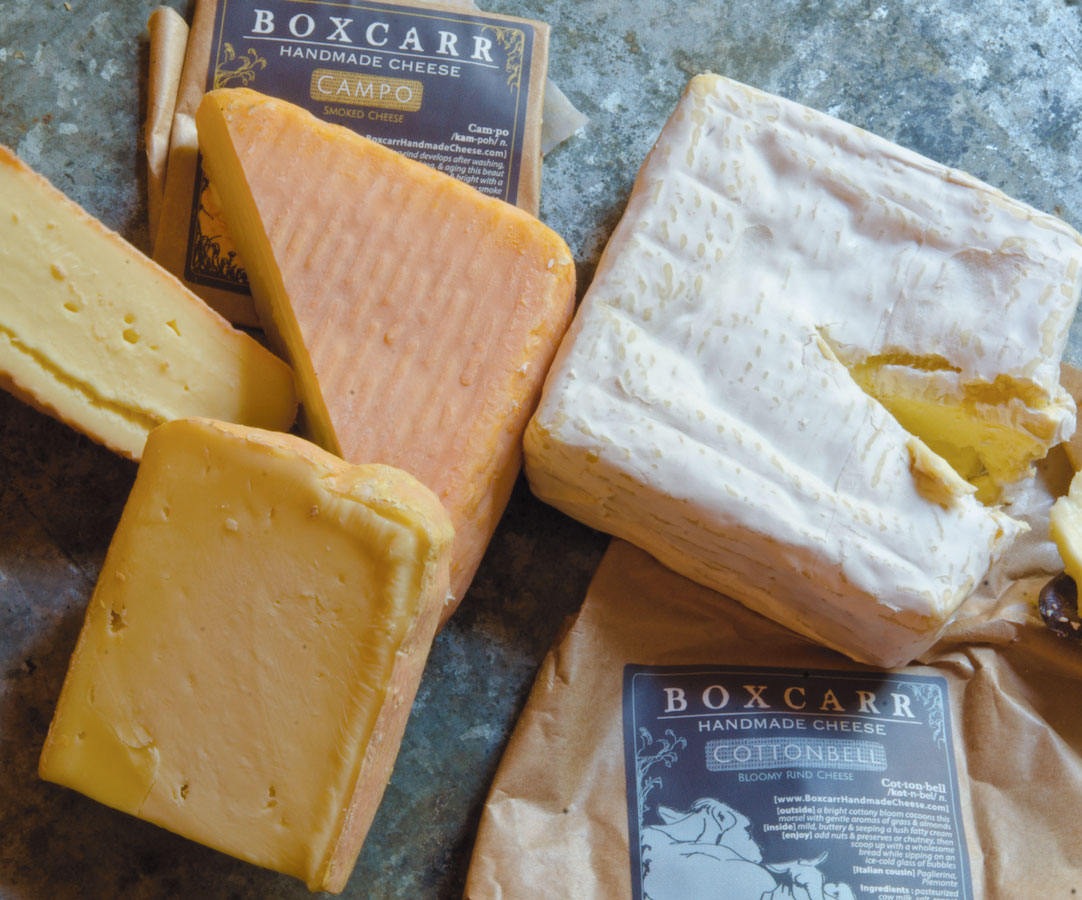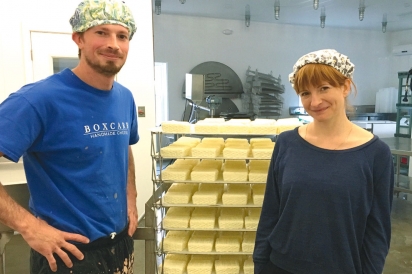Boxcarr Cheese
Heading west out of Raleigh and north from Durham, a traveler can slowly shake off the residential and escape to the rural. The landscape slowly takes on the tell-tale signs of a once — and sometimes still — active farming community. There is no shortage of rolling hills filled with herds of varying breeds and sizes, and old General Stores, some still in operation, while some the victims of necessary modernity. One can enjoy the residual calming aesthetic that comes from viewing aging barns, rough-hewn fence posts, grazing cattle, and a simple sign announcing the presence of an old farm from 1772 — as well as a new creamery from 2015.
Ask just about any cheesemonger in North Carolina who they think is the hot new up-and-coming cheese producer, and most likely you’ll hear the name Boxcarr. Ask the same question of the judges at the 2015 North Carolina State Fair and you’ll get the same answer, which is why Boxcarr Handmade Cheese was awarded Best In Show in only their first few months — yes, months — of operation.
Boxcarr Handmade Cheese is the somewhat accidental brainchild of the brother and sister team of Austin and Samantha (Sam) Genke, and their craft is getting noticed and distributed not just in the Tarheel State, but in many of the major culinary centers in the US: New York, San Francisco, Chicago, Portland, San Antonio, and Philadelphia to name just a few.
Austin and Samantha grew up in sunny Vero Beach, Florida. With a citrus farmer for a father and a mother of Italian heritage, their upbringing included an avid appreciation for food. While the warm weather suited them well, the culture of Southeast Florida didn’t, so when Samantha headed across the continent to Olympia, Washington for college, her younger brother Austin followed. Being only 16 years old, Austin needed a guardian, and so his big sister stepped in to fill that roll.
With Samantha in college, Austin attended a vocational program in culinary arts, excelling to the point that he earned a scholarship to the prestigious Culinary Institute of America in Hyde Park, New York. He eventually ended up working for Chef Mario Batali at the Venetian Hotel in Las Vegas.
After leaving Washington, Samantha moved back to the Sunshine State, working with cheese in the Specialty Department of Whole Foods Market in the Orlando suburb of Winter Park, Florida.
So how did they go from Florida to Washington to New York, and then back to Florida, but eventually land in North Carolina? Well, Samantha will tell you that it was goats that drove her here, and not just goats, but also Goat Lady Dairy.
Samantha’s love of the capra aegagrus hircus (domesticated goat) extends past the goat logo on their website, despite the fact that they make just one cheese that is only partially made from goat milk. She loves goats so much that her daughter, Rosie, is named for her favorite goat.
Realizing that Florida doesn’t have the cooler climate appropriate for raising goats, she sought opportunities elsewhere to work with nannies, billies, and kids. So she headed to North Carolina, and worked for several years with Ginnie, Steve, and Lee — the founders of Goat Lady Dairy in Climax, North Carolina. Her time there included working in the cheese room and assisting with their “Dinners at the Dairy,” but the job that was probably the most influential was the season she spent as a “kidding” intern. That experience caring for pregnant nannies during the cold weather breeding seasons was a labor of love, one that included long nights sleeping in drafty barns to ensure the good health and easy progression of the birthing process.
That stint at Goat Lady Dairy led to a nearly decade long association with another scion of North Carolina cheese making: Chapel Hill Creamery. Beginning in 2005, Samantha worked as a cheesemaker with Flo Hawley and Portia McKnight, founders of Chapel Hill Creamery, which was an invaluable experience that continued to ignite the spark of what was to come.
At the same time she was learning and honing her cheese-making craft, Samantha’s brother Austin was tiring of the Las Vegas lights and was looking for a setting a little calmer, offering a lifestyle to be closer to the land and to his family. So, yet again, Austin followed Samantha, and this time to the Old North State, where he and his wife began a farming and livestock career raising pigs and chickens on what they called Boxcarr Farms.
After various stints for both brother and sister in the kitchens and front of house at various restaurants in the Triangle, as well as maintaining a farming life, they stumbled onto an old food truck, which they bought, renovated, and began operating throughout the area, most especially at the Eno River Farmer’s Market. Austin and Samantha gained quite a following over the course of the two years the food truck was in full-time operation, most especially with a few private clients for whom the food truck is still put into action for special catering events. However, another interesting experiment popped up during those food truck days: Samantha began making some cheese on a very small scale.
Fearless, innovative, and determined are the three adjectives which came to this writer during my several hours spent with Samantha and Austin Genke. They seem to have a peaceful drive to create and share their talents. I got the sense that the philosophy driving their varied career incarnations is that as long as they are honest and dedicated to their craft and to their family, everything else will take care of itself. They are satisfied with their current successes, but at the same time driven to share more of their creativity with a public who may not have had the pleasure to experience their form of culinary innovation.
Fearless, innovative, and determined are also the adjectives best used to describe the physical incarnation of Boxcarr Handmade Cheese. Samantha’s small scale cheese making experiments in the old food truck eventually led them to designing and building an actual production facility housed on that aforementioned old farm dating back to 1772 in the community of Cedar Grove, NC. They broke ground on their modest building in 2014. With Austin acting as the primary contractor and builder, he and a cousin built the structure with their own hands. Austin turned a personal tragedy (a fire at his own home on the same farm land) into an opportunity to learn much of what it takes to build — or rebuild — a structure. He shadowed the contractor on the recreation of his damaged home and applied what he learned to the construction of a 2,900 square foot production area, aging room, and office space. The facility was finished in the spring of 2015. Quickly following a USDA inspection on April 1st, 2015, their first cheese was ready just a few days later, on April 4th.
Months later, in October of 2015, Boxcarr Handmade Cheese showcased their handiwork at the North Carolina State Fair and came away with a total of 8 ribbons, 3 of which were First Place Blue Ribbons, including “Best of North Carolina Cheese” and “Best in Show Cheese.” Not too bad for just a few months on the job.
What was the cheese that won “Best in Show” at the Fair? Well, the name is Cottonseed, and like all of Boxcarr’s cheeses, it is Italian-inspired. Samantha and Austin’s maternal heritage is steeped in Italian tradition, as are their cheeses, inspired by classics such as Robiola, Tallegio and, in the case of Cottonseed, Scimudin. Traditionally a goat’s milk cheese, Scimudin hails from the Alps in Italy’s Lombardy region. Boxcarr’s version is a blend of goat milk (from an Asheboro farmer whom Samantha met during her time working at Goat Lady Dairy) and cow’s milk (from Holstein and Jersey cows raised at a dairy in Gibsonville). It is a delicate bloomy rind cheese with a paste the color of ivory, and a lusciously supple, slightly sweet, and creamy texture very similar to a ripe brie — oozy and mushroomy. While it is very common to serve similar bloomy-rind cheeses with some type of fruit spread, I would tread lightly and give it just the lightest touch of sweetness from fruits such as cherries or blueberries. And don’t pass up the opportunity to pair this beauty with a dry French cider, an Italian Orvieto, or even a crisp yet fruity Prosecco.
It’s not just their Italian heritage which informs the current direction of their offerings, but also the presence of fellow cheesemaker and close friend, northern Italian-born Alessandro Trompeo. Her creative culinary passions meld perfectly with those of Samantha and Austin, and their partnership at Boxcarr brings a “new world” interpretation to some “old world” classics.
Their Italian-inspired lineup stays in northern Italy, this time turning its attention to Robiola, a classic of the Langhe region in the Piemonte. Rosie’s Robiola is a soft-ripened cheese with a slightly ruddy, slightly pinkish rind covering a beautiful paste of silky texture and a tangy palate. While I prefer to let this cheese speak on its own, it is certainly within tradition to serve Robiola with a little olive oil, salt, and pepper. Of course, a cheese from the Piemonte would require a wine from the Piemonte, and a couple of choices come to mind. Gavi, made from the Piemonte’s Cortese grape, brings the fruit weight necessary to stand up to this sticky beauty, while a medium-bodied Barbera d’Alba would bring rich dark cherry notes and supple tannins to balance this cheese.
Boxcarr travels back to Lombardy for the inspiration of it’s next two creations: Lissome and Campo. Both cheeses are classic washed-rind, semi-soft Taleggio recipes. Washed-rind cheeses are cured (or washed) with a briny mixture along with other mold-bearing liquids like beer, brandy, or wine. This curing concoction introduces a bacteria which ferments and ages the cheese, sometimes giving the rind an assertive aromatic, but giving the cheese itself a luxurious, satiny, creamy texture.
In the case of Lissome, it is washed, appropriately, with their favorite Piemontese beer called Clan!Destino?. They treat the curd gently, retaining moisture and giving the cheese a sweeter profile, while with Campo, they are a bit rougher on the curd to remove moisture, allowing it to stand up to the 58 minutes it spends being cold-smoked over pecan wood. The smoke is not at all overwhelming, but allows the cheese to offer both maturity and youth on the palate. A heftier wine such as a Nebbiolo from the Piemonte would bring the weight appropriate for a Taleggio style cheese, and would be a perfect partner for these slightly more robust gems.
Maybe it’s fate, but it is certainly ironic that a handful of Italy’s Piedmont-style cheeses end up here in North Carolina’s Piedmont. Fate and goats certainly played a part in attracting Samantha and Austin Genke to North Carolina. The opportunity to hone their cheesemaking and culinary skills kept them in the Tarheel State. Their reciprocal contribution to North Carolina is their craft — their undoubtedly yummy craft.






